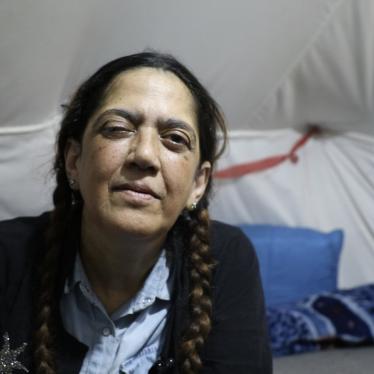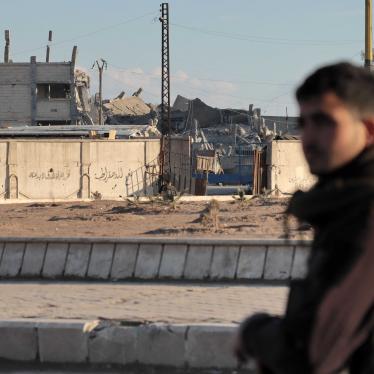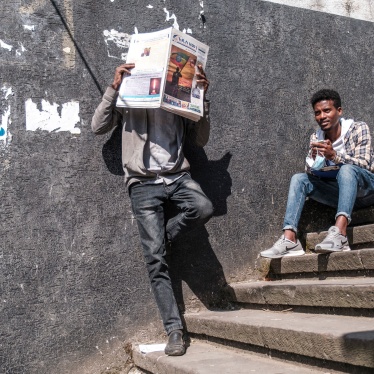(Baghdad) – Iraqi army soldiers at two checkpoints in Anbar governorate have arbitrarily prevented a group of displaced families from returning home in what appears to be an act of collective punishment, Human Rights Watch said today.
The families were taken to camps for displaced people in Anbar after being blocked from returning in late February 2018 and again in early June. The families were displaced by fighting against the Islamic State (also known as ISIS) in 2014 and now want to return. The area has been under the control of the Iraqi government since February 2015. The families are from the Sa’ada tribe, whose members have been accused of affiliating with ISIS, Anbar residents told Human Rights Watch.
“Baghdad authorities have rightly said many times that families from areas retaken from ISIS should be able to return to their homes if they want to,” said Lama Fakih, deputy Middle East director at Human Rights Watch. “It is unacceptable for soldiers to arbitrarily block residents from going home, in direct contradiction to the central government’s orders to facilitate safe and voluntary returns.”
On May 2, 2018, Human Rights Watch interviewed three residents of al-Khalidiya Central Camp for displaced people who are originally from al-Baghdadi, a town in Anbar governorate 180 kilometers northwest of Baghdad. They said they fled al-Baghdadi in August 2014 after anti-ISIS forces began fighting ISIS fighters in the town with airstrikes and ground-fired munitions. Iraqi security forces retook the town in February 2015, and since then the town has remained relatively stable despite a few attacks in the area over the past months, but no one has returned. The two women and a man interviewed said they had applied through the camp managers for security clearance to return home in early 2018 as part of a group of 51 families from al-Baghdadi living in two camps in al-Khalidiya.
The camp managers said they obtained permission for their return from the camp’s security forces and from both the Anbar Operations Command and the neighboring Jazeera Operations Command. At about 3 p.m. on a day in late February, 18 of the families boarded three government buses from Iraq’s Transport Ministry planning to return home.
One woman, 43, said the buses reached the al-Akouba checkpoint at about 9 p.m. Soldiers from the army’s 7th division stopped them and checked their identity cards. “After holding us there for an hour and a half, they said that we were not allowed to return to our homes and had to go back to the camp,” she said. “They didn’t give us any reason why.”
A Sa’ada sheikh said that even though the families had clearance, forces of the Jazeera Operations Command, which controls the checkpoint, chose not to recognize the clearance. The sheikh said that on April 21, the commander of the Jazeera Operations Command assured him that the military had no problem with the families’ returning home, but that the mayor of al-Baghdadi was pressuring him to get his forces to block the returns.
The sheikh said as he met with the commander, the mayor arrived and told the commander that the families could not return because they were ISIS supporters. Neither the mayor nor the commander made any reference to concerns around the security situation in al-Baghdadi, he said.
“If the government stops me from returning home, that means I am not an Iraqi anymore,” said a second woman, who is 29. “Otherwise I would have a right to my home.”
Three al-Baghdadi residents in al-Khalidiya Central Camp and the sheikh told Human Rights Watch that in early June, another group of at least nine al-Baghdadi families who had obtained the necessary security clearances boarded government buses again for al-Baghdadi. The people interviewed said they were in touch with the families during the journey and that they said that this time they were allowed to pass through al-Akouba checkpoint, but that they were stopped at a checkpoint run by the army’s 9th division in al-Baghdadi and taken to another Anbar camp for the displaced. Once the families arrived, the people interviewed lost contact with them.
Human Rights Watch wrote to Haidar Ukaili, a representative of the Prime Minister’s Advisory Council, on June 12, asking why the families from al-Baghdadi were prevented from returning home and what measures were being taken to allow their return. He stated in a reply email on June 14, that a group of 18 families were stopped from returning on April 27 “due to not having security permits” but that on June 3, 11 families were allowed to return to al-Baghdadi. Human Rights Watch has not been able to verify that 11 families were allowed to return and whether these families included those stopped by the 9th division in al-Baghdadi in early June.
Ukaili’s email made clear that other than the 11 families who were reportedly allowed to return, other families had been blocked from returning either “due to not having security permits” or because, as his email said, “There is caution with the return of the rest of the families due to fears of retaliation as some of the family members belong to ISIS. Therefore, they were told to wait for the time being until the issue is resolved tribally.”
In the cases Human Rights Watch documented, the people interviewed said that the families had the needed security permits, which appears to be supported by the fact that Ministry of Transport buses were sent to the displacement camp to return them home.
At the same time, Ukaili’s email implies that al-Baghdadi families are being penalized collectively because some have relatives who were members of ISIS. It is not the first time Iraqi authorities have contended that families related to ISIS suspects cannot remain in their own communities for their own safety.
Since 2014, Human Rights Watch has reported on scores of incidents across Iraq in which local authorities prevented families from returning home. All of the reports have been linked to allegations that the families supported ISIS because their relatives or communities had been accused of ISIS membership. Displaced people have the right to voluntarily and safely return home once the reason for their displacement no longer exists.
It is a basic international standard that punishment for crimes should only be imposed on people responsible for the crimes, after a fair trial to determine individual guilt. Imposing collective punishments on families, villages, or entire communities is strictly forbidden and is a war crime. Members of aid groups monitoring returns in Anbar told Human Rights Watch that the situation with the al-Baghdadi families is just one of many similar incidents there. On May 27, they said, security forces and tribal leaders prevented more than 50 families from returning to their homes in various towns in west Anbar, and sent them into secondary displacement in camps. Lack of coordination on security clearances between the various operations commands allegedly played a critical role, they said.
The authorities should immediately facilitate the return of families who want to return to areas not affected by ongoing military operations, including from the camps, Human Rights Watch said. They should also allow families to choose to stay in camps with unrestricted movement into and out of the camp and unrestricted communications, or to allow them to relocate elsewhere.
Anbar’s new Returns Committees, established in April along with equivalent committees in other governorates to facilitate a consultative and principled returns process, should advocate with local and Baghdad authorities on behalf of the al-Baghdadi families to facilitate their return.
Baghdad authorities should take transparent steps to sanction all officials, including from Iraq’s military and security forces, who prevent people from returning home unlawfully or as a form of collective punishment, including considering criminal charges where appropriate.
“If the Iraqi government is serious when it insists that if there is no evidence that individuals have links to ISIS they are innocent under the law, it needs to demonstrate that any officials who break the law will be punished,” Fakih said.








